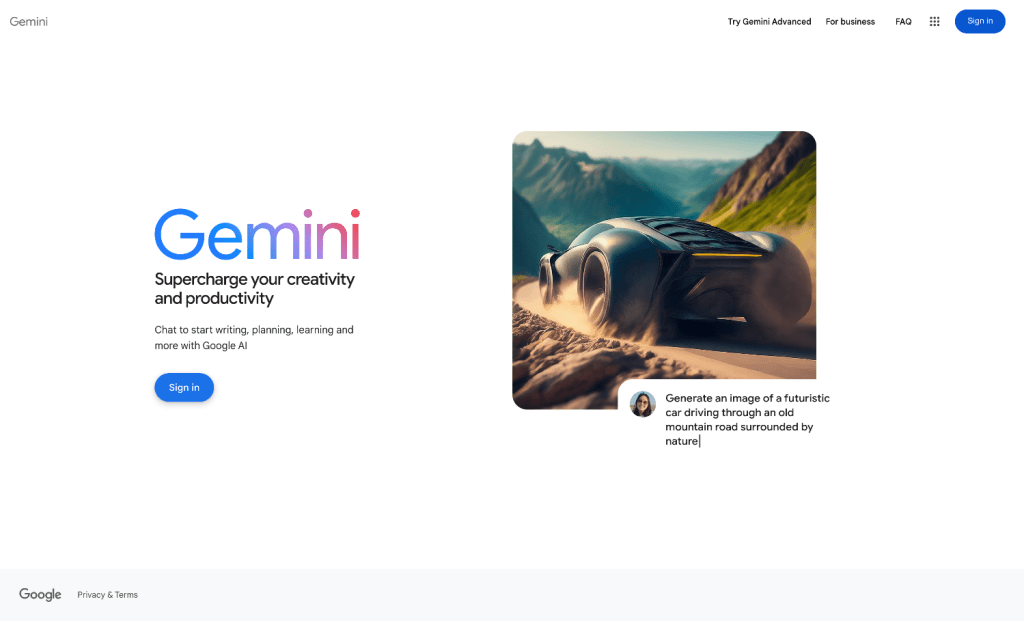Updated: Jul 07, 2024 By: Marios

Ever wondered what Google Gemini is formerly known as Bard and why it’s making waves in the tech world? I've got you covered. Google Gemini is the latest innovation from Google, designed to revolutionize how we interact with technology. By seamlessly integrating advanced AI capabilities, it promises to enhance user experiences across various platforms.
Imagine having a digital assistant that not only understands your needs but anticipates them. Google Gemini aims to make this a reality, pushing the boundaries of what's possible with artificial intelligence. Whether you're a tech enthusiast or just curious about the latest trends, understanding Google Gemini could give you a glimpse into the future of smart technology.
What Is Google Gemini?
Google Gemini represents Google's cutting-edge advancement in AI technology. It aims to create more intuitive and responsive digital experiences for users.
Overview of Google Gemini
Google Gemini integrates advanced AI capabilities to provide an intelligent digital assistant. This technology anticipates user needs and delivers personalized assistance across various applications. Developed by Google, Gemini pushes the boundaries of what artificial intelligence can achieve, enhancing the user experience in unprecedented ways.
- Personalized Assistance: Google Gemini offers tailored support by understanding user preferences and habits. For example, it can suggest the best routes for daily commutes or recommend new content based on past activities.
- Contextual Understanding: The AI comprehends context to provide accurate responses in real time. It's adept at handling complex queries by analyzing and interpreting the nuances of user interactions.
- Seamless Integration: Gemini integrates smoothly with various Google services like Gmail, Calendar, and Maps, ensuring a unified and cohesive user experience.
- Advanced Machine Learning: It employs sophisticated machine learning algorithms to continuously improve performance, adapting to new information to maintain high accuracy.
- User Anticipation: The AI preempts user needs by predicting future actions. For instance, it might prepare a report before a scheduled meeting or remind users of upcoming deadlines.
Google Gemini stands at the forefront of AI advancements, promising to redefine how users interact with technology by providing a seamless, intelligent, and personalized experience.
Evolution and Development of Google Gemini

Google Gemini has undergone significant progress, evolving from conceptual stages to a leading AI technology. This journey includes pivotal moments and promising future directions.
Historical Context and Milestones
Google Gemini's origins trace back to Google's commitment to pioneering AI. In 2018, Google announced initial research on an intelligent digital assistant beyond conventional capabilities. By 2020, initial prototype testing began within Google's ecosystems, reflecting early success in personalized assistance and contextual understanding.
Google's 2021 I/O conference highlighted Gemini's advancements, showcasing machine learning enhancements and integration capabilities. By late 2022, broader beta testing rolled out, enabling user feedback to refine Gemini's performance. These milestones illustrate Google Gemini's evolving capability and strategic development pathway.
Future Prospects and Updates
Google Gemini's future promises continued innovation and integration. Anticipated updates include enhanced contextual analysis and expanded application integration. Google's roadmap indicates plans to incorporate multilingual support for diverse global markets. Further enhancements include predictive analytics to improve user experience and expanded machine learning algorithms.
Anticipated updates aim at refining semantic understanding, enabling Gemini to provide more precise, personalized interactions. Google also envisions Gemini as a key component in smart home ecosystems and enterprise solutions, ensuring versatile applications across various sectors.
How Google Gemini Works

Google Gemini leverages advanced AI algorithms to revolutionize digital interactions, anticipating user needs and providing tailored assistance.
Technology Behind Gemini
Google Gemini uses a fusion of deep learning models and neural networks. These models analyze vast data sets to predict user preferences and behaviors. For instance, its integration with natural language processing (NLP) allows it to understand context and semantics in user queries. TensorFlow, Google's open-source machine learning library, underpins Gemini's processing capabilities, enabling high efficiency and scalability.
Comparison with Other Large Language Models
Compared to other large language models like OpenAI's GPT-4, Google Gemini excels in personalization and contextual accuracy. While both systems use deep learning, Gemini's framework integrates more comprehensive data analytics and real-time adaptive learning. This means Gemini not only responds to queries but also adjusts based on user interaction patterns.
For example, when compared to Microsoft's Turing-NLG, Gemini demonstrates superior integration capabilities with Google’s ecosystem, enhancing user experience across platforms like Gmail, Google Docs, and Google Assistant.
Practical Applications of Google Gemini
Practical applications of Google Gemini span a range of industries due to its robust AI capabilities. Real-world examples illustrate its impact and potential benefits.
Use Cases in Various Industries
Healthcare: Google Gemini improves diagnostic accuracy, assists in personalized treatment plans, and helps predict patient needs. Hospitals utilize it to streamline administrative tasks and enhance patient engagement through virtual assistants.
Finance: It optimizes risk management and fraud detection, offering personalized financial advice and automating customer service through chatbots. Banks use it to predict and mitigate financial risks, improving client interactions.
Retail: Google Gemini enhances customer experience via personalized recommendations, inventory management, and dynamic pricing strategies. Retailers implement it to analyze purchasing behaviors and adjust stock based on predictive analytics.
Education: The technology supports adaptive learning platforms, tailoring educational content to individual student needs. Educators deploy it to automate administrative tasks and provide personalized learning experiences.
Transportation: It aids in route optimization and predictive maintenance for vehicles. Logistics companies benefit from it by improving delivery efficiency and forecasting demand patterns.
Real-Life Impact and Case Studies
Mayo Clinic: Adoption of Google Gemini in diagnostic procedures led to a 20% improvement in early disease detection. The AI-assisted diagnosis tool reduced administrative workload, allowing healthcare professionals to focus more on patient care.
JPMorgan Chase: Implementation of Google Gemini resulted in a 30% increase in fraud detection accuracy. The technology enhanced risk management strategies, leading to better financial security and client trust.
Walmart: The retail giant utilized Google Gemini for dynamic pricing and inventory management, resulting in a 15% increase in sales. Personalized shopping experiences improved customer loyalty and repeat purchases.
Khan Academy: Google Gemini's integration into their platform enabled personalized learning paths, improving student performance by 25%. The adaptive content delivery tailored educational experiences to individual learning styles.
FedEx: Logistics operations saw a 10% increase in efficiency with Google Gemini’s route optimization and predictive maintenance features app. The technology facilitated timely deliveries and reduced transportation costs.
Accessing and Using Google Gemini
Google Gemini enhances user experiences by personalizing and anticipating user needs. Follow these steps to access and use this technology efficiently.
How to Get Started
First, ensure you've got a Google account. Then, sign in to your account on any Google platform. Navigate to the settings menu and look for the Google Gemini option. Enable it to start receiving personalized assistance across Google's ecosystem, which includes services like Gmail and Google Assistant.
Tips and Best Practices
First, keep your account secure by using strong passwords and enabling two-factor authentication. This keeps your personalized data safe. Next, regularly update your preferences in the Google Gemini settings to ensure the assistance aligns with your changing needs. Customize notifications to avoid information overload. Finally, stay informed about new features app by checking the Google blog and support pages. Frequent updates help you maximize Gemini's capabilities. Use these tips to harness the full power of Google Gemini's AI technology.
Ethical Considerations and Challenges
Ethical considerations and challenges arise when utilizing advanced AI technologies like Google Gemini. Transparency, fairness, and data privacy remain central concerns.
Data Privacy and Security Measures
Google Gemini employs robust data privacy and security measures, protecting user information against unauthorized access and misuse. Encrypted data transmission ensures sensitive details remain confidential. Google regularly updates its security protocols to address emerging threats, instilling trust in users who depend on their services. Key measures include:
- Encryption: Google encrypts data both in transit and at rest, minimizing risks of data breaches.
- Access Controls: Strict access controls ensure only authorized personnel can access sensitive information.
- Auditing and Monitoring: Continuous monitoring and auditing provide an additional layer of security by detecting unusual activity.
Addressing Bias and Fairness
Addressing bias and fairness is critical in AI systems. Google Gemini incorporates mechanisms to identify and mitigate biases in its algorithms. This ensures equitable treatment across diverse user groups. Specific strategies include:
- Diverse Training Data: Ensuring training data represents varied demographics mitigates inherent algorithmic biases.
- Model Audits: Regular audits of AI models help identify and rectify any biases present in decision-making processes.
- User Feedback: Google actively collects user feedback to further refine models, improving fairness and reducing biases.
These measures collectively foster a more ethical and trustworthy AI environment for all users.
Conclusion
Google Gemini represents a significant leap in AI technology with its ability to provide personalized assistance and anticipate user needs. Its integration across various industries demonstrates its versatility and effectiveness. Ethical considerations remain crucial and Google's commitment to transparency fairness and data privacy is evident in its robust measures.
By addressing these challenges Google Gemini aims to foster a more ethical and trustworthy AI environment. As we continue to embrace advanced AI technologies it's essential to stay informed and proactive in ensuring they serve the greater good.
Frequently Asked Questions
What is Google Gemini?
Google Gemini is an AI technology known for offering personalized assistance and anticipating user needs through advanced AI algorithms.
How is Google Gemini integrated within Google's ecosystem?
Google Gemini seamlessly integrates with various Google services, enhancing functionalities across platforms like healthcare, finance, and education.
Can you provide real-world examples of Google Gemini's applications?
Google Gemini is used at the Mayo Clinic to improve patient care and at JPMorgan Chase to enhance customer service and operational efficiency.
How can I utilize Google Gemini effectively?
Maximize Google Gemini's potential by integrating it into your systems, leveraging its predictive capabilities, and aligning it with your organizational goals.
What ethical considerations are associated with using Google Gemini?
Ethical considerations include transparency, fairness, and data privacy, ensuring that AI systems are used responsibly and ethically.
How does Google address data privacy and security with Gemini?
Google employs robust data privacy measures, such as encryption and access controls, to protect user data while using Gemini.
What steps does Google take to ensure fairness in Gemini's AI systems?
Google incorporates diverse training data and regular model audits to mitigate bias and ensure equitable treatment in Gemini’s AI systems.
Is Google Gemini suitable for my business?
Google Gemini can be highly beneficial, especially if you are in industries like healthcare, finance, or education, offering improved efficiency and user experience.
How does Google Gemini compare to other AI technologies like ChatGPT?
Gemini offers real-time data from the internet, while ChatGPT relies on predefined datasets, making Gemini potentially more adaptable and accurate in real-time scenarios.
What are the challenges in using advanced AI like Google Gemini?
Challenges include addressing bias, ensuring transparency, and maintaining data privacy, all crucial for ethical AI deployment. Google continuously works on these aspects to improve Gemini.



